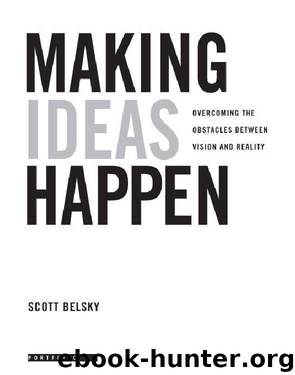Making Ideas Happen by Scott Belsky

Author:Scott Belsky
Language: eng
Format: mobi, epub
Publisher: Penguin USA, Inc.
Published: 2010-03-10T10:00:00+00:00
—Thomas Jefferson, Letter to Isaac McPherson, August 13, 1813
The notion of “sharing ideas liberally” defies the natural instinct to keep your ideas a secret. Yet, among the hundreds of successful creatives I’ve interviewed, a fearless approach to sharing ideas is one of the most common attributes. Why? Because having the idea is just one tiny step along the road to making that idea happen. During the journey, communal forces are instrumental in refining the very substance of the idea, holding us accountable for making it happen, building a network that will push us to go above and beyond, providing us with valuable material and emotional support, and spreading the word to attract resources and publicity. By sharing your idea, you take the first step in creating the community that will act as a catalyst to making it happen.
Take Wired magazine’s editor in chief, Chris Anderson, as an example. Anderson wrote the best-selling book The Long Tail, which argues in favor of a business model that capitalizes on underserved niches (à la Amazon or Netflix), selling a large amount of rare (or low-demand) items in small quantities to a widely scattered cross-section of consumers. In many ways Anderson’s theories relate to how new technologies allow us to harness the power of the masses—and it’s a philosophy that he himself embraces.
“I don’t believe you can do anything by yourself,” Anderson explains. “Any project that’s run by a single person is basically destined to fail. It’s going to fail because it doesn’t scale. If one of my projects can’t attract a team, I pretty much figure that there’s something wrong with it.” To illustrate this point, Anderson uses the example of his idea to launch a blog that targeted nerdy, tech-obsessed fathers like him. Once he shared the idea on his blog, the project quickly attracted an enthusiastic constituency, and thus Geek Dads, a member of the Wired blog family, was born. Had the project not attracted a viable team within six weeks, Anderson says he would have shelved the idea.
Anderson uses his blog to share and “beta test” the ideas that go into his books. “My philosophy is to give all of my ideas away for free,” he explains, knowing that those ideas “will be improved by a community that collectively knows more than I do.” A case in point is his latest book Free: The Future of a Radical Price, which, like The Long Tail, evolved out of a feature article originally published in Wired. Using his blog, Anderson refined the concepts presented in the book based on feedback provided to him via comments and e-mails. In a sense anticipating his critics, an entire chapter of Free is “constructed around complaints or concerns or push-back,” wherein Anderson directly quotes issues raised by his readers and then responds to them. By sharing his ideas with the community, Anderson begins to build traction with an engaged audience in advance of the book release while at the same time using the collective intelligence of his readers to hone his arguments.
Download
This site does not store any files on its server. We only index and link to content provided by other sites. Please contact the content providers to delete copyright contents if any and email us, we'll remove relevant links or contents immediately.
Hit Refresh by Satya Nadella(8338)
The Compound Effect by Darren Hardy(7559)
Change Your Questions, Change Your Life by Marilee Adams(6641)
Nudge - Improving Decisions about Health, Wealth, and Happiness by Thaler Sunstein(6633)
The Black Swan by Nassim Nicholas Taleb(6191)
Daring Greatly by Brene Brown(5641)
Deep Work by Cal Newport(5464)
Principles: Life and Work by Ray Dalio(5322)
Rich Dad Poor Dad by Robert T. Kiyosaki(5149)
The Myth of the Strong Leader by Archie Brown(4789)
Man-made Catastrophes and Risk Information Concealment by Dmitry Chernov & Didier Sornette(4736)
Big Magic: Creative Living Beyond Fear by Elizabeth Gilbert(4723)
The Slight Edge by Jeff Olson(4722)
Discipline Equals Freedom by Jocko Willink(4635)
Digital Minimalism by Cal Newport;(4542)
The Motivation Myth by Jeff Haden(4526)
Stone's Rules by Roger Stone(4415)
Management Strategies for the Cloud Revolution: How Cloud Computing Is Transforming Business and Why You Can't Afford to Be Left Behind by Charles Babcock(4131)
The Doodle Revolution by Sunni Brown(4043)
